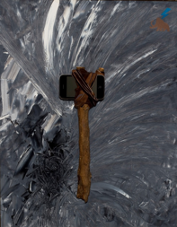
January 1, 2000. Not just a new century, but a new millennium. Spotless, for the briefest moment, though far from empty. Arriving so brimful of promise and hope. “What will it be like?” we wondered, staring almost child-like at the clock as it approached the new era. A brand-new, unopened, ready-to-use millennium! And this time, with all we’d learned over past millennia, we would get things right.
Knock on wood.
A thousand years earlier, the Holy Roman Empire ruled Europe. Leif Eriksson set what may have been the first European foot onto the New World. One small step for a Viking, but… The population of the entire globe was about that of today’s Indonesia. A lot can change in a thousand years. A lot more, it seems, cannot.

In his novel Telluria, the Russian writer Vladimir Sorokin describes a post-apocalyptic scene in which a man living in a cave, clothed in animal skins, discovers a long-discarded and seemingly useless laptop lying in the dirt. Rather than ignore the ancient artifact, he lashes it to the end of a long stick, then uses it as a club to bludgeon his enemies. A stark reminder that – even as science offers unrivaled advancements – human nature has not always advanced accordingly. Twitter has taken the place of the campfire. Our weapons are bigger and shinier, if still clubs in essence.
Despite its sweet nanosecond of unsoiled promise, a quick rata-ta-ta of events, from hanging chads, 9/11, Lehman Brothers to … already such a long list … quickly disabused any idea this new era would be all that different from the last Flying cars from the Jetsons? Not yet. Brain transplants? Jordan Peele may have brought us closer, but there’s still a way to go (please hurry).
While more sadly and seriously, the promise of the United Nations charter of 1945, social progress and better standards of life in larger freedom, remains so stubbornly elusive. Which, fast forward, brings us to the present.
Keeping with the most American of themes, ‘new’, we skip from new century and new millennium to a new decade. The Twenties. And what an entrance.
In the last Twenties, art produced by the modernists cast both shadows and lights that reach us still. Gertrude Stein, Ernest Hemingway, T.S. Eliot with his Wasteland. Dali’s surreal contradictions, Picasso’s deconstructions, Fitzgerald’s unrealized dreams. The question has loomed: What would our own Twenties hold for the artists of today? Wait no longer. And what a smorgasbord! Existential angst? Check. Disorientation? Absurdity? Made to order. Lost Generation? If things don’t abate soon, we may even have that one covered. To the more cynical, it seems the Age of Aquarius was more way station than destination. Still, progress ‘is’ being made, even if by that old rhythm, two steps forward, one step back. It can be hard on those backward strides to remember how far we’ve already come. John Lewis, lying in state under the Capitol Rotunda, reminds us of that. George Floyd, on the other hand, reminds us of how far we have yet to go.
And how shall we overcome this déjà vu all over again?
For some, there’s Norman Vincent Peale’s Power of Positive Thinking. Wish a problem to go away, and … poof. If only! Homegrown experiment: next time, wish the car to stop instead of applying brakes. If that doesn’t work out, see “friction brakes” to consider possibility number two: science. As in medical science, social science, political science. Because even if all the solutions aren’t here yet, those road maps toward them are.
In my new play, I Have Seen the Mississippi, a character based on my father Ivo, who was a historian, says: “We don’t study history to understand the past. The past is finished, gone, water under the bridge. No, we study history to understand today and tomorrow. Not to repeat our mistakes, or so we hope.” He adds, “You want a history lesson? Go touch a hot stove. There, that was a valuable history lesson!”
Many hot and all-too familiar stoves out there just now. Again, a check list. 1918, pandemic? Roger that. 1929: economic collapse? You betcha. 1930s: nationalism? Google “politics today.” 1960s: the struggle for voting rights and racial equality? The dream continues, so too does the nightmare.
Yet, as if in some time-streamed episode of Twilight Zone-meets-Groundhog Day, for too many, history is like Cassandra of Greek myth, its lessons falling on deaf ears. A new age of scientific reason and enlightenment may yet lie ahead. If not, there’s always the old standby: Knock on wood.
24/7 already seems like such a quaint and slower, almost horse-and-buggy pace. It feels like we’re up to 25/8 at least, blink and you might so easily miss one or more major events. There’s hardly time to ask a question anymore, as by the end of it some interruption will have bulldozed its way toward the front of the thought. Still, we’ll try.
New millennium? What new millennium?
25,492 Total Views, 8 Views Today






